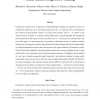Free Online Productivity Tools
i2Speak
i2Symbol
i2OCR
iTex2Img
iWeb2Print
iWeb2Shot
i2Type
iPdf2Split
iPdf2Merge
i2Bopomofo
i2Arabic
i2Style
i2Image
i2PDF
iLatex2Rtf
Sci2ools
CORR
2008
Springer
2008
Springer
Model-Based Compressive Sensing
Compressive sensing (CS) is an alternative to Shannon/Nyquist sampling for acquisition of sparse or compressible signals that can be well approximated by just K N elements from an N-dimensional basis. Instead of taking periodic samples, we measure inner products with M < N random vectors and then recover the signal via a sparsity-seeking optimization or greedy algorithm. The standard CS theory dictates that robust signal recovery is possible from M = O (K log(N/K)) measurements. The goal of this paper is to demonstrate that it is possible to substantially decrease M without sacrificing robustness by leveraging more realistic signal models that go beyond simple sparsity and compressibility by including dependencies between values and locations of the signal coefficients. We introduce a modelbased CS theory that parallels the conventional theory and provides concrete guidelines on how to create
Related Content
| Added | 09 Dec 2010 |
| Updated | 09 Dec 2010 |
| Type | Journal |
| Year | 2008 |
| Where | CORR |
| Authors | Richard G. Baraniuk, Volkan Cevher, Marco F. Duarte, Chinmay Hegde |
Comments (0)

